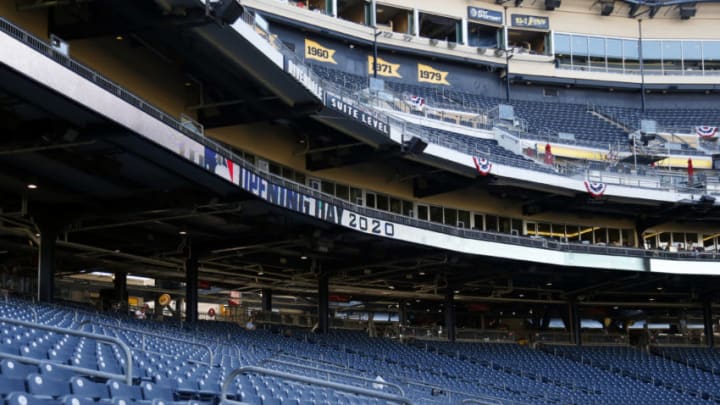Too many adjustments have been made to view this year’s MLB results as legitimate
It’s time to question the legitimacy of the 2020 MLB season.
It’s largely not the fault of MLB. The game’s leaders have essentially done the best they could to cope with an impossibly complex COVID-19 situation.
Their one egregious error, failing to lock in a plan that would have allowed the start of play in time to complete at least an 81-game season, calls for shared blame with the MLBPA, which – like the owners — prioritized financial concerns over getting the season started.
Still, as games are canceled and makeup doubleheaders stacked one atop the other, too many cute, short-term fixes are being employed just in the name of keeping things moving. The sense is becoming inescapable that history will view the 2020 season as largely an illegitimate contrivance, and its champion as a freak show survivor.
Begin with that 60-game schedule. That’s less than twice as long as a normal spring training exhibition schedule. No MLB season this short has been played since 1878. And since there were only a half dozen teams that year, everybody played everybody else a dozen times.
This year, with regional scheduling, no team is scheduled to play as many as one-third of the other teams. Nor will any team play any other team as often as in 1878.
Even if every teams ends up playing 60 games — a large assumption to be sure — it will equal the second shortest season in MLB history. Only the 58-game 1877 season was shorter.
The additional round of playoffs announced the day before the season began is probably a necessary revenue step. The bills do have to be paid for, they are extensive, and post-season media is the primary revenue source.
But those are at best rationalizations, not positive steps. From a legitimacy standpoint, lengthening the post-season is a negative. The practical impact of adding another round of playoffs is to further dilute the prospects of the best teams surviving to the World Series.
Statistically, in any competition involving teams of relatively even ability, the better team is projected to win about 55 percent of the time. In a normal three-round playoff structure, that means the chance of the best team winning the World Series is 55 percent times 55 percent, or about 17 percent.
Add another round of playoffs, and you make more money but you also reduce the best team’s chance of winning the trophy to under 10 percent. That’s not quite as bad as determining the champion by the roll of dice, but it’s not far from it.
The merits of the addition of other provisions, among them the seven-inning doubleheaders, the expanded rosters, the universal DH, and the runner at second in extra innings, can be debated. But the one thing that can be said with certainty is that all are expediencies forced upon the game by COVID rather than having been adopted by free choice and deliberative consideration.
For that reason, all those steps also cast a shadow on the legitimacy of the eventual results.
But the biggest shadow may be cast by the seemingly interminable succession of doubleheaders that continue to be booked. The Miami Marlins, one of the teams whose schedule was thrown into disarray by COVID, are scheduled to play five doubleheaders, four of them in September. The St. Louis Cardinals, another COVID team, have five DHs scheduled at present, and they still have three makeups versus the Chicago Cubs to be re-scheduled.
To date, one-third of the teams are involved in makeup doubleheaders prompted by COVID outbreaks. Most of those teams had no positive COVID reports themselves; they were casualties of another team’s outbreak.
Each re-scheduled doubleheader discombobulates not only the COVID-stricken team’s pitching plans but also those of its opponent. In many instances – the Chicago Cubs, the New York Yankees, the Milwaukee Brewers, the Philadelphia Phillies – those teams envision themselves as post-season contenders, visions that could be compromised if they are forced to go six or seven-deep in their rotations down the stretch.
At this stage, it’s safe to say that a 2020 MLB champion eventually will be crowned. It is far less certain that, in ensuing years, either the champion or the season itself will avoid being saddled with a major asterisk.
